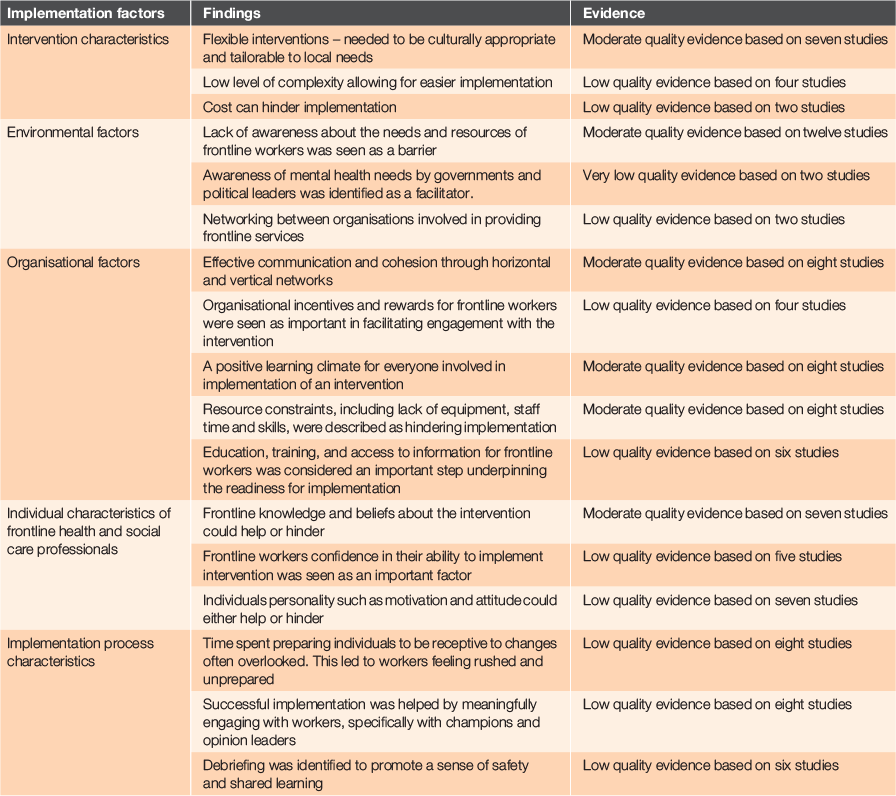Coronavirus (COVID-19): implementation facilitators to supporting programmes for improving the resilience and mental health of frontline workers during and after an epidemic
Vanessa Jordan 1New Zealand Cochrane Fellow, University of Auckland, Auckland, New Zealand. Email: v.jordan@auckland.ac.nz
Journal of Primary Health Care 12(4) 395-396 https://doi.org/10.1071/HC15957
Published: 22 December 2020
Journal Compilation © Royal New Zealand College of General Practitioners 2020 This is an open access article licensed under a Creative Commons Attribution-NonCommercial-NoDerivatives 4.0 International License
Cochrane Review: Pollock A, Campbell P, Cheyne J, Cowie J, Davis B, McCallum J, McGill K, Elders A, Hagen S, McClurg D, Torrens C, Maxwell M. Interventions to support the resilience and mental health of frontline health and social care professionals during and after a disease outbreak, epidemic or pandemic: a mixed methods systematic review. Cochrane Database of Systematic Reviews 2020, Issue 11. Art. No.: CD013779. doi: 10.1002/14651858.CD013779.1
Background: On 11 March 2020 the World Health Organization (WHO) declared the novel coronavirus (COVID-19) outbreak a global pandemic.2 Since then healthcare worldwide has had to rise to the challenge of how to deliver healthcare safely to people with health needs while also protecting frontline staff. From previous severe acute respiratory syndrome (SARS) outbreaks, we know that frontline workers report higher levels of burnout, psychological distress, and posttraumatic stress than their peers who have not been on the frontline of an epidemic.3,4 To prevent or ameliorate the consequences of frontline epidemic work the authors of this Cochrane review set out to assess the effectiveness of interventions supporting the resilience and mental health of these workers and to identify facilitators and barriers for these interventions.1
Clinical Bottom Line: This review only found one study of the effectiveness of interventions for supporting resilience and mental health in frontline staff working during an epidemic. This study showed that psychological first aid did not have any effect on the quality of life of the participants.1 This review then went on to qualitatively consider factors that would help to successfully implement programmes to support frontline workers (see below).1

|
References
[1] Pollock A, Campbell P, Cheyne J, et al. Interventions to support the resilience and mental health of frontline health and social care professionals during and after a disease outbreak, epidemic or pandemic: a mixed methods systematic review. Cochrane Database of Systematic Reviews 2020; 11[2] World Health Organization. WHO Director-General’s opening remarks at the media briefing on COVID-19, 11 March 2020.
[3] Maunder RG, Lancee WJ, Balderson KE, et al. Long-term psychological and occupational effects of providing hospital healthcare during SARS outbreak. Emerg Infect Dis 2006; 12 1924–32.
| Long-term psychological and occupational effects of providing hospital healthcare during SARS outbreak.Crossref | GoogleScholarGoogle Scholar | 17326946PubMed |
[4] Maunder RG, Lancee WJ, Rourke S, et al. Factors associated with the psychological impact of Severe Acute Respiratory Syndrome on nurses and other hospital workers in Toronto. Psychosom Med 2004; 66 938–42.
| Factors associated with the psychological impact of Severe Acute Respiratory Syndrome on nurses and other hospital workers in Toronto.Crossref | GoogleScholarGoogle Scholar | 15564361PubMed |


